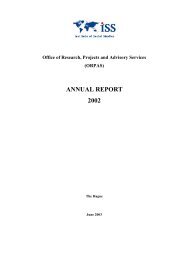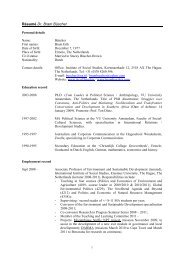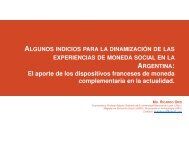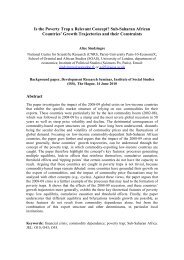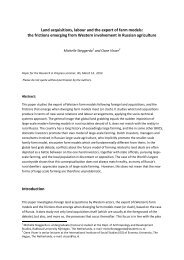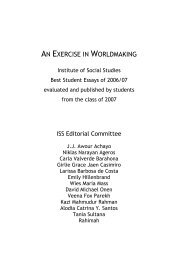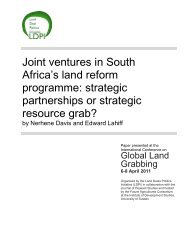AN EXERCISE IN WORLDMAKING 2009 - ISS
AN EXERCISE IN WORLDMAKING 2009 - ISS
AN EXERCISE IN WORLDMAKING 2009 - ISS
Create successful ePaper yourself
Turn your PDF publications into a flip-book with our unique Google optimized e-Paper software.
74 SABR<strong>IN</strong>A BR<strong>AN</strong>DT<br />
tigue shaped the circumstances for a paradigm shift (Pender 2001: 397).<br />
It led to a debate on aid effectiveness with a focus on the moral obligation<br />
to reduce poverty (World Bank 1998).<br />
The World Bank director James Wolfensohn responded to this with<br />
the Comprehensive Development Framework (1999). Following the importance<br />
of poverty reduction and ownership of development policies,<br />
the concept of Poverty Reduction Strategy Papers entered the stage.<br />
Since these development strategies are written by the recipient government<br />
they are assumed to be nationally owned. Poverty reduction is the<br />
umbrella under which the development strategy is supposed to function.<br />
The factual changes in the aid landscape were that the volumes of aid<br />
donations as well as the number of actors involved increased. Aid had<br />
become more complex and the need for an aid architect was expressed<br />
(Meyer and Schulz op cit: 1). Especially the recipient countries challenged<br />
the fact that aid issues were mainly discussed by the donor community.<br />
This led to the constitution of the High Level Committee for<br />
Aid Effectiveness by the OECD, which includes members from both<br />
donor and recipient countries. Their meeting in Paris in 2005 led to the<br />
formulation of the Paris Declaration (PD) by which ‘aid’ allegedly entered<br />
a new era.<br />
The focus of this essay is the principle of ownership that the PD introduced,<br />
meaning that the design and the implementation of aid and the<br />
development strategy should be in the hands of the recipient:<br />
Partner countries exercise effective leadership over their development<br />
policies and strategies and co-ordinate development actions (OECD 2005:<br />
3).<br />
3 OLD HABITS DIE HARD<br />
Did the Paris Declaration indeed formalise the paradigm shift in development<br />
aid? The focus on poverty reduction is of course a striking feature.<br />
The principles of ownership and participation also signify a change<br />
away from the universalistic approaches of SAPs. The implication of nationally<br />
owned development strategies would probably mean a lesser focus<br />
on macroeconomic stability, and more focus on context specific solutions.<br />
However, in recent years many of these principles have been criticised<br />
for their – covert – neoliberal foundations. The PRSP programme has<br />
been identified as “old wine in new bottles”, referring to its remarkable




